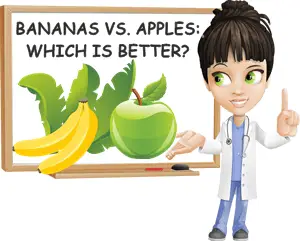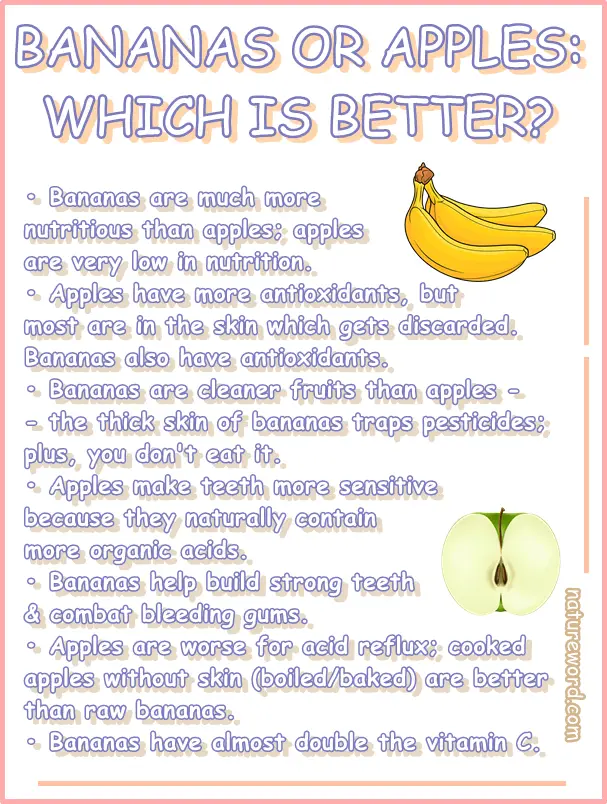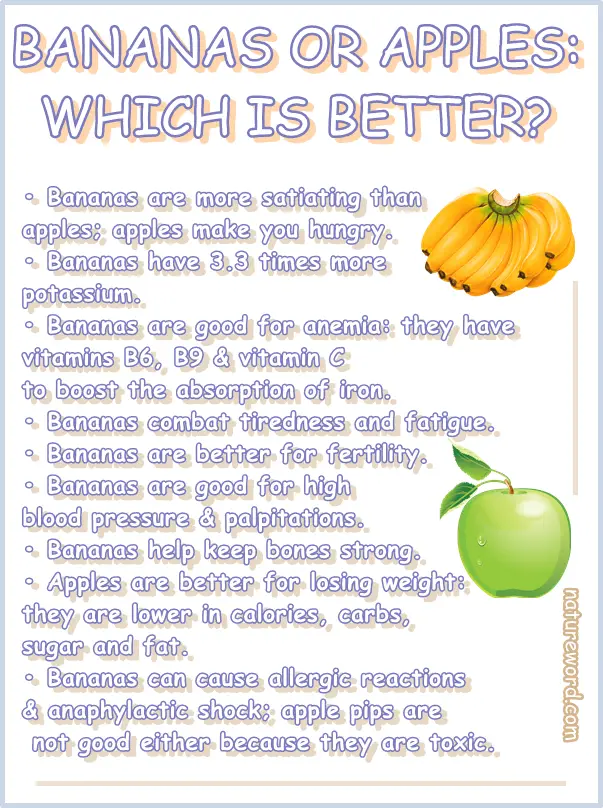Which is better to eat between bananas or apples? Are bananas healthier than apples? Or are apples healthier than bananas? What exactly makes one fruit better than the other? Are there more vitamins in bananas or apples? What about minerals? Antioxidants? Which is lower in calories between bananas and apples? What about fat and carbs?
Apples and bananas are two fruits most people eat. In part because they taste good, and have a flavor profile that speaks to the majority of people in the sense that it’s uncomplicated, centered around sweet and tangy, with a generic fruitiness, and in part because they are readily availably and quite accessible price wise. At least compared to other options. But which is better to eat between the two?

Which is healthier between a banana and an apple?
Bananas are much more nutritious than apples.
Apples are modestly nutritious at most, whereas bananas boast quite a generous nutritional value compared to most other fruits.
Just 100 grams of banana, which is a small to medium banana, provides 10% of the entire daily recommended intake of vitamin C for the average adult, about 30% of vitamin B6 values, around 8% potassium and over 10% manganese.
By comparison, in apples, the only notable nutrition fact of apples is their vitamin C content which sits at 5% of daily values.
Apples have more antioxidants
All foods, irrespective of color, taste, season and other factors, have antioxidants.
But colorful foods are generally observed to have more of them. Between bananas and apples, apples tend to have more antioxidants.
This is especially true for dark red colored varieties, and novelty cultivars with red flesh.
This being said, the fact that apples are higher in antioxidants than bananas doesn’t mean that bananas don’t have any antioxidants at all, or that they have fewer benefits for health just because they are lower in antioxidants.
Studies have identified bioactive antioxidant constituents in bananas with anticancer properties.
Not just this, but apples carry most of their antioxidants in their skin (except for varieties with reddish flesh) and discarding the skin would instantly make the fruit drop in terms of antioxidant value and benefits for health. And many people do just that, they throw away the apple skin because it may be too chewy and they don’t like the texture or can’t eat it, or because they have sensory issues, or because they want to avoid the pesticides accumulated in the skin of the fruit.
Bananas are a cleaner fruit than apples
Generally speaking, bananas are a cleaner fruit than apples. The thick skin of a banana traps pesticides, preventing them from crossing over to the pulp inside, allowing for a cleaner, healthier fruit. By comparison, apples don’t have the luxury of a thick skin so pesticides both accumulate in the skin, and reach the flesh. Not to mention that the skin of apples is edible, and a big part of their nutrition, and many people do eat it.

Apples make teeth (more) sensitive
Bananas don’t usually sensitize teeth, but apples almost always do. How many of you have been told at least once that eating an apple cleans your teeth? Or that eating an apple can substitute brushing your teeth? Well, there is some truth to this.
Apples naturally contain organic acids such as malic acid. These natural acids have a mild erosive effect and can dissolve food particles and help remove them from teeth.
At the same time, organic acids in food erode tooth enamel. Over time, the loss of tooth enamel makes teeth feel more sensitive. The more acidic or tangy foods someone eats, the more sensitive their teeth may feel.
Apples are only mildly acidic so their effects on teeth are minimal and, honestly, they are more beneficial than harmful. But if your teeth are already overly sensitive, more acidic varieties of apples will trigger sensitivity and pain.
The same effect is observed in chronic acid reflux, but on a greater scale: stomach acids that escape into the esophagus and get regurgitated eat away at tooth enamel, exposing the underlying layers and causing sensitivity and pain.
Bananas are actually good for your teeth and gums
One of the long-term benefits of bananas is they help keep teeth and gums healthy. Bananas are a good source of vitamin C, better than apples actually. Vitamin C stimulates the production of special types of collagen called collagen 1 and 3 which help build teeth and maintain teeth structure.
Not just this, but vitamin C in bananas help keep gums healthy and sticking to teeth, preventing bleeding gums and tooth loss. Phosphorus, potassium and magnesium in the fruit further contribute to teeth composition, providing structure and rigidity. Find out what other vitamins you need for strong bones and teeth.
Apples are worse for acid reflux
Between the two fruit, apples are generally worse for acid reflux disease. That doesn’t mean bananas are necessarily good for the condition either, but a lot of people with acid reflux tolerate bananas better than apples. One reason for this is because bananas lack the organic acids that give apples their fresh, tangy flavors; the organic acids in apples are what cause side effects for people with GERD.
And apple skin too because it’s rich in fiber. Vs apples which are meant to be eaten with skin, bananas aren’t so that’s one more reason they may be better tolerated. However, an underripe banana can be just as bad for acid reflux as an apple. See other side effects of underripe and unripe bananas.
But do know that eating too much fruit in general, including bananas and apples, is not good for acid reflux. Raw fruits, and fruits with skin in particular, are bad for the digestive condition. Instead of raw fruits, you can have boiled or baked fruit such as a boiled or baked apple, without skin, and it should be better than a banana. Find out what foods to eat and to avoid for acid reflux.
Bananas have more vitamin C than apples
One thing that makes bananas slightly healthier than apples is their higher vitamin C content. How much vitamin C in bananas? A serving of 100 grams of banana provides about 8.7 milligrams of vitamin C which represents 9.6% of daily values for the average adult. To help build a bigger picture, one medium banana weighs about 110 grams and gets you around 10.6% of all the vitamin C you should get in a day.
How much vitamin C in apples? A serving of 100 grams of fresh apple, all varieties considered, provides 4.6 milligrams of vitamin C. That is 5% of the daily requirements of vitamin C for an average adult. To get roughly about the same amount of vitamin C that you do from eating bananas you would have to eat a medium-sized apple at around 180 grams.

Bananas are more satiating
Whereas apples stand a higher chance of making you more hungry after you eat them. Although that’s not true for absolutely everyone (nothing is really applicable to absolutely everyone).
And it has to do with the natural makeup of the fruit.
A banana is less than 75% water; an apple is 85% to 89% water. So really a banana is more fruit. Not just this, but apples have a higher content of organic acids which have a slight irritating effect on the stomach, triggering the production of gastric juices which makes you hungry.
Bananas have 3.3 times more potassium
The average adult needs to get 4700 milligrams (or 4.7 grams) of potassium in their diet every single day. Safe to say most people don’t.
But potassium is needed heavily for healthy bones and teeth, the heart and vascular system, to combat high blood pressure, and for muscle coordination and digestive health.
Bananas have 3.3 times the potassium content of apples.
How much potassium in a banana? One large banana at 136 grams can get you around 10% of all the potassium you need in a day.
Find out more about the potassium content of bananas, including how many bananas you would have to eat to get all the potassium you need in a day.
By comparison, one large apple at 215 grams has 9.89 milligrams of potassium which is just 4.89% of daily requirements for an adult.
Discover more facts about the potassium content in apples, including how many apples it would take to get all your potassium for the day.
Bananas are good for anemia
Bananas are actually a good food to eat for anemia, whereas apples do next to nothing for the condition.
What makes bananas good for anemia?
Their nutrition. Bananas get you around 30% of all the vitamin B6 you need in a day, and small amounts of iron, all in just 100 grams.
Vitamin B6 helps produce hemoglobin in red blood cells, and boosts the capacity of hemoglobin to absorb oxygen, actively helping combat anemia and associated symptoms such as fatigue and muscle weakness.
You also get 5% of all the vitamin B9 you need in a day from just 100 grams of banana; vitamin B9 or folate is needed to make red blood cells to transport oxygen to tissues and organs and boost vitality. Bananas are also a good source of vitamin C (10% RDI per 100 grams) – vitamin C boosts absorption of iron from food with benefits for anemia.
Discover other great reasons to eat more bananas.
Bananas combat tiredness and fatigue
If you are feeling low on energy because you haven’t eaten anything in a while, haven’t slept or are overworked, a banana can help you more than an apple.
A medium-sized banana at around 110 grams can get you lots of vitamin B6 and some vitamin B9 too.
Vitamins B6 and B9 boost vitality and energy levels via their anti-anemia effects. The B vitamins also support nervous system activity and muscle function for increased productivity and vigor. Not just this, but bananas are high in carbs (22-23 grams per 100 grams of fruit) and sugar (12-13 grams) for an instant boost in energy levels.
Bananas are better for fertility
Eating bananas is actually better for fertility than eating apples. What makes bananas the better choice is, once again, their nutritional value.
Bananas provide over 10% of the daily recommended intake of manganese for an average adult in just 100 grams of fruit. Manganese naturally maintains and boosts fertility in men, but also women.
Studies have correlated manganese deficiency with reduced fertility, and even infertility, as well as birth defects. In women, manganese from bananas helps with ovulation. Bananas are also a good source of vitamin C at 10% of daily requirements per 100 grams of fruit. Vitamin C supports progesterone production for optimal fertility in women.
Bananas are good for high blood pressure and palpitations
If you have high blood pressure and palpitations, then bananas are a better choice of a fruit for you.
Eating one large banana at 136 grams can get you 10% of all the potassium you need in a day and around 8.7% of your daily magnesium values.
Potassium and magnesium induce vasodilation and release pressure in blood vessels, essentially lowering blood pressure numbers.
Apples are not good for high blood pressure or palpitations because they don’t contribute measurably to daily nutritional values.
Not just this, but eating apples can cause stomach acidity which, if severe, can lead to palpitations. This is a more likely occurrence in people with GERD (acid reflux disease).
Bananas are a better food for bone health
You wouldn’t think it, but bananas do help keep bones strong and healthy.
More than apples. Bananas contribute measurably to daily potassium values, and also provide some magnesium and vitamin B9.
Not just this, but bananas have twice the phosphorus content of apples and almost two times more vitamin C.
Why is this relevant? Potassium, magnesium and phosphorus are needed to physically build bones. Vitamin C represents the raw material needed for the body to produce collagen – collagen is present in bones and accounts for their structure and properties such as resistance to fractures.
Vitamin C, vitamin B9, but also phosphorus and magnesium are further responsible for regulating processes related to the continual renewal of bone tissue throughout the body.
Learn what are the 5 minerals you need for bones and teeth.
Apples have less carbs, less sugar, less fat and fewer calories
If what you’re looking for is more of a diet food, then apples might be the better choice for you. Vs bananas, apples have:
- 13-14 grams of carbs per 100 grams vs 22-23 grams of carbs in 100 grams of banana
- 10-11 grams of sugar versus 12-13 grams of sugar in bananas
- under 0.2% fat vs 0.35% fat in bananas
- 52 to 62 kcal (kilocalories, calories) compared to 89 kcal per 100 grams of banana
The carbohydrate, sugar and fat content together with the calorie content of apples makes them a better food for a weight loss diet than bananas. This being said, bananas are not necessarily bad bad for losing weight either, despite being villainized for weight loss uses. At the end of the day, how much of a food you eat ultimately determines the effects it’s going to have on your weight and a banana can definitely be incorporated in a weight loss diet successfully. And help keep you satiated better than an apple.
Bananas can cause allergic reactions and anaphylaxis
Any food has the potential to cause allergic reactions. And while both bananas and apples carry very low risks for allergic reactions, at least far lower than dairy milk, nuts, peanuts, celery or sesame seeds, bananas are slightly more likely to cause an allergic reaction compared to apples. This is one aspect that makes apples better than bananas, although apple pips (seeds) are toxic if consumed in large amounts at once.
Banana allergy is more likely to occur in people who are also allergic to avocado, pineapple, mango, passion fruit, kiwifruit, strawberries, figs, chestnuts, balloons or surgical gloves. Look out for symptoms such as hives, diarrhea, nausea, vomiting, tongue or throat swelling, shortness of breath, wheezing, coughing, difficulty breathing, headaches, low blood pressure and fainting.
Conclusion
While it may look like bananas are better than apples in terms of nutritional value and benefits for health, that doesn’t mean you should stop eating apples. Apples are still healthy and good to eat, more so if you like them. Actually, while going for more nutritious foods is recommended to boost health, eating a variety of foods is just as important for good health long-term. So you don’t have to choose one. The info is purely for educational purposes, so you can have the clearest picture where your favorite foods stand in terms of nutrition and health benefits.
